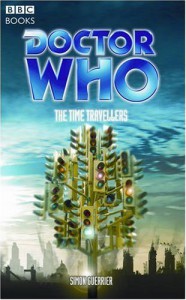Crossing the high bar of authenticity

I don't envy authors who write novels for established media franchises, as doing so poses challenges that they don't face when writing their own original creations. For such works to succeed, they must capture a certain tone of the series in a way that is true to the source material while broad enough to acknowledge their readers' often differing interpretation of it. This is especially true in terms of characterization without the filtering role that an actor or actress plays by taking scripts from multiple authors and filter them into their performance. Without this standardizing step, authors risk writing characters that can seem false to their source, even before having to address how an audience already familiar with these characters regards them.
For these reasons, writing such a book means crossing a high bar of authenticity in order to succeed, one that is even more challenging for the Doctor Who franchise, with its shifting tone over the decades and often outdated elements, Yet Simon Guerrier manages the feat successfully. His novel goes back to the beginnings of the franchise itself, offering a story in which the first Doctor and his original group of companions — his granddaughter Susan and teachers Ian Chesterton and Barbara Wright — arrive in London in 2006 after the TARDIS encounters a man while traveling inside of time and space. The crew finds themselves in a future in which the city is under attack from an unknown power, with a team of scientists developing a primitive form of time travel in the hope that it might prove the key to victory. As the Doctor and his companions discover, though, the experiments have resulted instead in a mounting series of problems, all of which must be solved amidst an impending invasion and while dealing with a hidden agenda.
Working as he does with the very first group of travelers Guerrier tackles attitudes and outlooks that are increasingly dated to his readers. Yet he manages to portray them in a way that is respectful while making it work for a story very different from the ones written by the writers of the day. His characters find themselves in a nightmarish world ingeniously constructed by Guerrier out of other stories from the show, imagining the world that would have resulted had not the Doctor defeated the threats that faced it. While the result is a world traumatized and grim, the genius of his approach is that because this is happening so early in the Doctor's travels he and his companions are unable to recognize the situation for what it is: an alternate future shaped by the evil the Doctor would go on to avert. None of them appreciate that the broader setting is wrong; for them it is simply is a future that is far darker than they imagined it could be.
In this respect what Guerrier has accomplished is much more than simple fan service, as he has drawn from nearly a half-dozen serials from the original series to develop his plot. And while the logic of the story does not hold as well as it might, overall the book is a remarkable feat: a novel that entertains on multiple levels while remaining true to its original source material. It is a book that every Doctor Who fan should read, ideally after having seen the episodes from which Guerrier draws the elements that serve as the source material for his novel so as to better appreciate the extent of his success with it.






